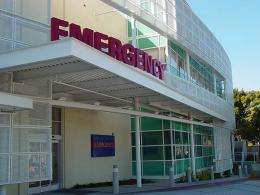Will anti-arrhythmic drug beat sudden cardiac arrest?

(Medical Xpress) -- Sudden Cardiac Arrest (SCA) is the leading cause of death in the United States. This form of heart attack kills 325,000 people every year, representing one death every two minutes. Almost all SCA victims die before they even reach a hospital. To identify a drug that paramedics can use in the field, UC San Diego Health System has opened a clinical trial to evaluate two medications to help restore the heart beat.
“Only five percent of sudden cardiac arrest victims survive their heart attack,” said Daniel Davis, MD, UC San Diego Director of Resuscitation Science in the Department of Emergency Medicine. “For more than 30 years we’ve been looking for an anti-arrhythmic drug to treat ventricular tachycardia, or what we call shockable rhythm, but we have not found a drug that consistently improves patient outcomes. This clinical trial will help us determine if either the drugs amiodarone or lidocaine may help prevent death.”
This NIH-funded clinical trial consists of three study arms to compare lidocaine, amiodarone and a placebo. The primary objective is to determine if survival is improved with a new formulation of amiodarone and to determine if amiodarone or lidocaine is more effective. The drugs are delivered by injection.
“If there is clear evidence that lidocaine or amiodarone works better in saving lives, we hope to end the study early to incorporate the drug into everyday treatment practice,” said Davis. “This effort could help save dozens of lives each year in San Diego and hundreds across California.”
Currently in San Diego there is no anti-arrhythmic being used by paramedics to treat patients. Either cardiopulmonary resuscitation or the use of a defibrillator to shock the heart into normal rhythm, are the only two treatment options.
This clinical trial will be conducted under “Exemption from Informed Consent” guidelines, which have been approved by the U.S. Department of Health and Human Services and the Food and Drug Administration. This means that the drug will be administered by paramedics to patients whose hearts have stopped beating. If a family member is present, they will be informed of the study and given the option of refusing participation.
“A patient in cardiac arrest is not capable of communication. Nor is it realistic to identify and contact family members in a timely fashion who can consent on their behalf,” said Davis. “When a patient is in critical need of rapid medical treatment, the priority is to provide treatment. Every second counts to save the heart and brain.”
The trial will launch in Spring 2012. More than 3,000 patients will be enrolled over the course of three to four years in ten different sites across North America.
This clinical trial is part of The Resuscitation Outcomes Consortium (ROC) which was created to conduct clinical research in the areas of cardiopulmonary resuscitation and traumatic injury. ROC consists of 10 Regional Clinical Centers and a Data and Coordinating Center that will provide the necessary infrastructure to conduct multiple collaborative trials to aid rapid translation of promising scientific and clinical advances to improve resuscitation outcomes. Trials may evaluate existing or new therapies as well as clinical management strategies such as novel hemorrhage control strategies and alternative methods of delivering CPR or defibrillation.















